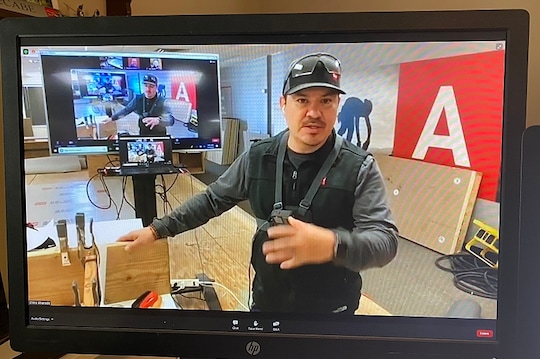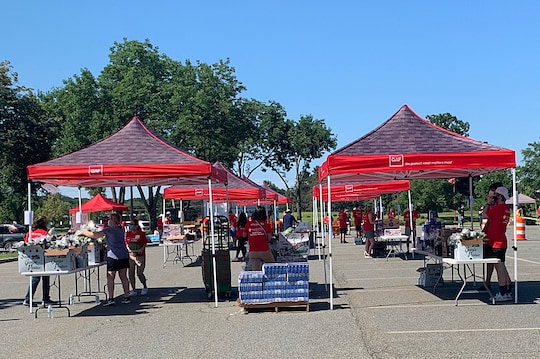
Toitures résidentielles
Formation en pose de couverture : Comment l'équipe C.A.R.E. (Center for the Advancement of Roofing Excellence) de GAF s'est ajustée pour mieux répondre aux besoins des entrepreneurs
The year 2020 has significantly changed the roofing industry-from how contractors serve their customers to how they build their skills and knowledge.For starters, training in roofing moved from in person to virtual. And the GAF CARE team embraced this approach to better serve contractors during this challenging time, delivering hundreds of training sessions and employing new training strategies that will benefit contractors in 2021 and beyond.Nurturing Roofing ExcellenceContractors faced unprecedented challenges over the last year-figuring out how to safely deliver services to customers, keeping their staff and team safe, and doing their best to stay on top of constantly changing regulations.This massive pivot also caused GAF CARE, or the Center for the Advancement of Roofing Excellence, to pivot to better meet the contractors' evolving business needs. GAF CARE delivers professional and educational training programs for residential and commercial contractors throughout the year, covering topics such as installation, sales, business development, roofing best practices, and industry codes and standards. They deliver training in English, Spanish, and French, and to date, more than 230 000 roofing professionals in the US, Canada, and Mexico have participated in CARE courses.Steven McCabe, CARE training manager, says over the last year his 30-plus person team mobilized to expand training options for contractors."Prior to the pandemic, it was pretty much nonstop traveling and training in person. Lorsque la pandémie a frappé, nous avons dû réagir parce que les gens voulaient toujours être formés. In less than a week and a half after we were told we could no longer meet in person, we had already started an intensive online training regimen," McCabe says.With in-person training not an option at the time, the CARE team started doing six webinars a week, giving contractors more opportunity to stay up to date on the latest industry trends and learn timely customer engagement and retention strategies. L'équipe de C.A.R.E. a créé de nouveaux cours de formation pour s'adapter aux besoins changeants des entrepreneurs pendant la pandémie, tels que des cours axés sur la sécurité et les directives de distanciation sociale, la vente par téléphone et l'utilisation d'outils virtuels comme Zoom et Google Meet pour la mobilisation et la communication avec les clients. A "Success with Service and Repairs" training series was one of the most popular offerings among contractors in 2020.More than 400 people attended some of the initial trainings, benefiting from engaging sessions that featured polls and digital whiteboards that allowed GAF trainers to mimic the traditional learning environment of in-person training in a virtual setting. Les formations duraient également entre 30 et 45 minutes, ce qui permettait aux entrepreneurs d'accéder rapidement aux informations pertinentes dont ils avaient besoin avec un minimum d'interruptions dans leur journée de travail. This was a departure from previous in-person sessions that would typically run for eight hours a day over the course of three days.The CARE team facilitated more than 415 webinars in 2020. L'équipe a également organisé 135 séances de formation en personne au cours du premier trimestre de 2020 avant que la pandémie ne frappe. In total, more than 23 120 roofing professionals in were able to access relevant training in 2020 to build their industry skills and knowledge.Training in Roofing: Looking Ahead for 2021Contractors have been very satisfied with GAF CARE training offerings - the team's training programs received a 4,9 out of 5 average customer satisfaction rating during the pandemic, McCabe says.In-person training is available again, so contractors can now access popular offerings like trailer training. Dans le cadre de cette formation, une remorque remplie de produits de toitures commerciales est garée sur un chantier où les équipes peuvent suivre une formation pratique de trois à quatre heures sur l'utilisation de ces produits. According to McCabe, the CARE team has started out by doing small group in-person training with fewer than 10 people who are socially distanced and wearing masks.Though in-person training has resumed, online education will continue to be available to meet the varying needs of different customers. McCabe, who has always had a passion for teaching and originally wanted to pursue a teaching career, is beyond proud of the work his team has done during such a challenging time in the industry."There's nothing like when you see a spark in somebody's eye, and they're like, 'Hey, I got it,' or when a contractor reaches out to you after several months and says, 'That training was amazing' and that it changed their company and their approach. That, to me, is the biggest reward," McCabe says.To view a list of upcoming webinars and training opportunities, check out the GAF CARE events calendar.
By Authors Satta Sarmah Hightower
29 juin 2021



